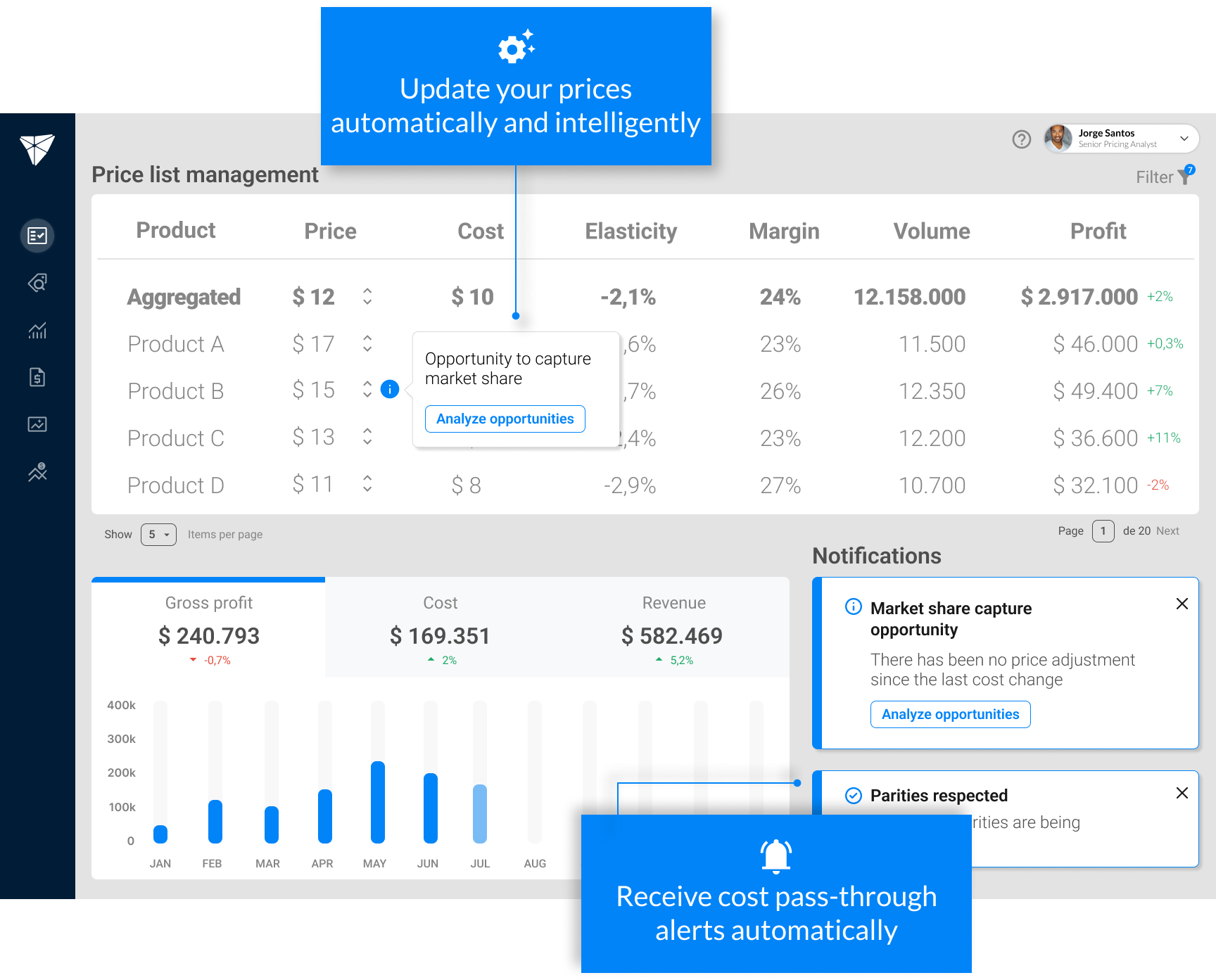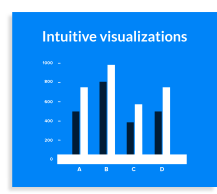Automated price updates and efficient business rule verification to generate time savings and competitive advantage through better price list management.

Key Benefits
Have artificial intelligence and a solid foundation on your side in the pricing process, maximizing the value generated.



Principais vantagens
Tenha a inteligência artificial e uma base sólida ao seu lado no processo de precificação, maximizando o valor gerado.

In companies with low pricing maturity, operational and strategic challenges are harmful. The lack of standardization creates problems in the consolidation, generation and monitoring of lists. Errors compromise pricing decisions, resulting in outdated prices and loss of competitiveness. See how the features of the Aprix system transform these challenges into opportunities for your company.
Inefficient operational process
The regular update of the price list is normally motivated by cost variations that impact the company’s margin. It is common for the pricing department to take a long time to consolidate this and other information necessary for decision making.
Even so, it is not always possible to carry out this consolidation in an ideal and frequent way, making the process inefficient, operational and often reactive. Therefore, the delay in passing on costs means loss of operating margin.
Intelligent and responsive system
The Price List Management module allows the user to make changes to prices with different levels of detail and aggregation (such as channel, product family, SKU and customer). In addition, it allows you to adjust prices in a more comprehensive way and also offers the functionality to simulate the impact of these changes on the company’s overall performance.
Through a tool specialized in pricing challenges, the platform executes the planning of changes in price lists with different objectives, whether for a specific product, for a specific sales channel or by family, for example.
Lack of transparency
Data consolidation and price list generation are processes that often do not have a standardized approval flow or a centralized database. It is common to have scattered files and spreadsheets, making it difficult to track the price history and pricing decisions made by each person.
A process without standardization in flows and documents invariably generates rework, manual errors and inadequate analysis. Depending on the sector, it can also generate infractions and fines.
Auditable approval flow
The module establishes an approval workflow that allows traceability of each decision made. The functionality contains two main views: a summarized version and a detailed version, with information on price variations, sales volume, profit, margins, costs, among others.
By practicing price governance, the maturity of the pricing process is increased. As a consequence, setting more assertive prices can maximize margins or sales volume, depending on the company’s strategy.
Non-compliance with business rules
It is common for business rules to be checked manually during the pricing process. In this process, the objective is to ensure that the rules of price relativity (between categories, channels, regions, SKUs, etc.) are consistent with what was theoretically established when building the pricing strategy.
As it is a very costly and complex step, some prices eventually break established policies. Situations like this leave the company in a poor position in the market, resulting in a loss of competitiveness and/or profitability.
Premises registration
With Aprix’s Price List Management module, price definitions can be carried out quickly and intuitively through the registration of business rules.
The system will automatically carry out all checks regarding the guidelines that must be respected for each price change and will display a notification if any are being broken.
This way, it is possible to effectively fulfill the strategic objectives set by the company.
Slowness in updating prices in the ERP
After the entire process of consolidating data, and generating and checking the price list, it is necessary to update the new values in the company’s management system for the commercial sector to begin generating sales at the new values.
This procedure takes time and operational effort, involving different systems and teams, which results in the loss of the opportunity to act with updated prices as quickly as possible.
Integration with platforms
The system works in integration with the ERP, automatically sending the prices defined for the software used by the company.
By automating a time-consuming operational task, the system relieves employees who perform this process manually, freeing up the team’s capacity to carry out strategic analyses.
Furthermore, it speeds up the transition to the process that involves other teams. This way, prices can quickly hit the shelves.
Work with the most up-to-date price as quickly as possible
Stop leaving money on the table. Automate tasks and gain agility in price pass-through with the Aprix system data centralization.
Price List Management
Automated price updates and efficient business rule verification to generate time savings and competitive advantage through better price list management.
Price Data Collection
Own and competitor prices at the POS to identify repositioning opportunities. Wide and automated price data collection, with data cleaning, processing and standardization.
Simulation and Optimization
Less reactive, more predictive: through simulation and optimization, project market movements with Aprix AI. Optimize price analyses automatically and maximize operating results.
Cost Consolidation
Optimizing the cost consolidation process, eliminating hours of human involvement in calculations, formatting and updating tax parameters.
Business Intelligence
Pricing execution monitoring with customizable visualizations of key pricing indicators, through Business Intelligence.
Competitiveness Dashboard
Competitiveness dashboard with B2B and B2C price positioning for competitor monitoring and price execution.
All rights reserved to Aprix.